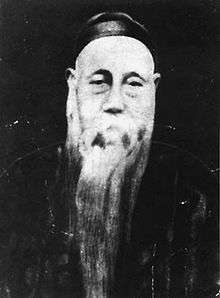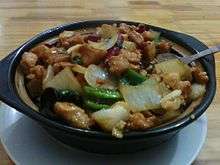Kung Pao chicken
| Kung Pao chicken | |||||||||||||||||
 Sichuan version of Gong Bao Chicken | |||||||||||||||||
| Traditional Chinese | 宮保雞丁 | ||||||||||||||||
|---|---|---|---|---|---|---|---|---|---|---|---|---|---|---|---|---|---|
| Simplified Chinese | 宫保鸡丁 | ||||||||||||||||
| |||||||||||||||||
Kung Pao Chicken (Chinese: 宫保鸡丁), also transcribed as Gong Bao or Kung Po, is a spicy stir-fry dish made with chicken, peanuts, vegetables, and chili peppers. The classic dish in Sichuan cuisine originated in the Sichuan Province of south-western China and includes Sichuan peppercorns. Although the dish is found throughout China, there are regional variations that are typically less spicy than the Sichuan serving. Kung Pao chicken is also a staple of westernized Chinese cuisine.
History


The dish is believed to be named after Ding Baozhen (1820–1886), a late Qing Dynasty official, and governor of Sichuan Province. His title was Gongbao (Kung-pao; Chinese: 宫保; pinyin: Gōngbǎo; Wade–Giles: Kung1-pao3; literally: "Palace Guardian").[1] The name "Kung Pao" chicken is derived from this title.
During the Cultural Revolution, the dish's name became politically incorrect because of its association with Ding. The dish was renamed "Fast-fried chicken cubes" (Hongbao Jiding) or "chicken cubes with seared chiles" (Hula Jiding) until its political rehabilitation in the 1980s under Deng Xiaoping's reforms.[2]
Versions
Sichuan version
The original Sichuan version uses chicken as its primary ingredient. In this original version, diced chicken is typically mixed with a prepared marinade.[3] Shaoxing wine is used to enhance flavor in the marinade.The wok is seasoned and then chili peppers and Sichuan peppercorns are flash-fried to add fragrance to the oil. In Sichuan, or when preparing authentic Kung Pao chicken, only Sichuan-style chili peppers such as facing heaven pepper or seven stars pepper (Chinese: 七星椒; pinyin: Qīxīngjiāo; Wade–Giles: Ch'i1-shing1-chiao1) are used. Smaller, thinner Sichuanese varieties may also be used.[4]The most important component of the dish is handfuls of Sichuan peppercorns. It is these peppercorns that give authentic Kung Pao chicken its distinctive numbing flavor. Use of hot and numbing flavor (Chinese: 麻辣味型; pinyin: Málà wèixíng; Wade–Giles: Ma2-la4 wei4-hsing2) is a typical element of Sichuan cooking.Then the chicken is stir-fried and vegetables, along with peanuts, are added. Kung Pao chicken starts off with fresh, moist, unroasted peanuts or cashew nuts.[5] These are often used instead of their pre-roasted versions. The peanuts or cashew nuts are dropped into the hot oil on the bottom of the wok first, then deep-fried until golden brown before the other ingredients are added.
Western versions
Versions commonly found in the west, called "Kung Pao chicken", "Kung Po", or just "chicken chilli and garlic" consist of diced marinated chicken stir-fried with orange or orange juice, ginger, garlic, chicken broth, sugar, cooking oil, corn starch, and salt and pepper to taste. The dish often includes or is garnished with whole roasted peanuts. Western variations can usually substitute the chicken for other meat such as pork or duck according to the customer's tastes.
The original version includes Sichuan peppercorns, which from 1968 until 2005 were illegal to import into the United States.[6] The ban was lifted in light of new processing methods, but the 37-year ban resulted in versions without Sichuan peppercorns.
_-1.jpg) Westernized version of Kung Pao chicken, served in London
Westernized version of Kung Pao chicken, served in London_-2.jpg) Another version of Kung Pao Chicken
Another version of Kung Pao Chicken
See also
References
| Wikimedia Commons has media related to Kung Pao chicken. |
| Wikibooks Cookbook has a recipe/module on |
- ↑ "Ding Baozhen—an outstanding minister of the Qing Dynasty". Replay.waybackmachine.org. 2008-08-20. Archived from the original on August 20, 2008. Retrieved 2012-01-23.
- ↑ "Savoring the Spice in Kung Pao Chicken". NPR. Retrieved 2012-01-23.
- ↑ "Easy Kung Pao Recipe". Easy Recipes, Tips, Ideas, and Life Musings. 2014-03-27. Retrieved 2016-10-28.
- ↑ Eats, Serious. "Real Deal Kung Pao Chicken Recipe". www.seriouseats.com. Retrieved 2016-10-28.
- ↑ "Gong Bao Chicken/Kung Pao Chicken 宫保雞丁/宫爆雞丁 recipe & photos". MaMaChineseCooking.com. 2009-06-22. Retrieved 2012-01-23.
- ↑ http://www.ecfr.gov/cgi-bin/retrieveECFR?gp=&SID=7eba58259bf266041c729291a8304a59&n=pt7.5.319&r=PART&ty=HTML#se7.5.319_119